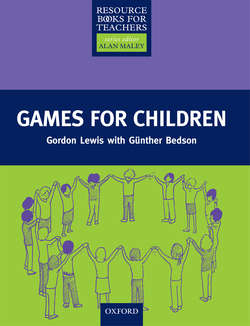Читать книгу Games for Children - Gordon Lewis - Страница 6
На сайте Литреса книга снята с продажи.
Introduction
ОглавлениеWho is this book for?
This book is for all teachers of English as a Foreign Language working with young children between the ages of four and twelve. It can be used by pre-school and primary school teachers as an extension of the general school curriculum as well as by parents in an informal private atmosphere. The games presented can stand alone or be used to complement an existing coursebook or syllabus.
Why use games in the EFL classroom?
Games are fun and children like to play them. That in itself is a strong argument for incorporating them in the EFL classroom. Playing games is a vital and natural part of growing up and learning. Through games children experiment, discover, and interact with their environment. Not to include games in the classroom would be to withhold from the children an essential tool for understanding their world; a world which the language teacher seeks to enlarge through the experience of a foreign language.
Games add variation to a lesson and increase motivation by providing a plausible incentive to use the target language. Remember that for many children between four and twelve years, especially the youngest, language learning will not be the key motivational factor. Games can provide this stimulus. The game context makes the foreign language immediately useful to the children. It brings the target language to life. The game makes the reasons for speaking plausible even to reluctant children.
What is a language game?
What distinguishes a language game from other communicative activities in the primary EFL classroom? Certainly, language games are fun. But all activities in a primary classroom should be. Games are also task based: English is a tool for the children to reach a goal which is not directly language related. Craft activities in the target language are also an example of this, as are songs. But that doesn’t make them games. A stricter denition is necessary for the purpose of a language games book.
What differentiates language games from other activities in the EFL classroom is the presence of a visible set of rules which guide the children’s actions, and an element of strategy – children must successfully apply their language (and other) skills. Games can be competitive, but this is not a precondition. Children can also employ their language skills strategically in co-operative games, where a group works together to achieve certain goals.
Language games are a healthy challenge to a child’s analytical thought. The rules of the game set clear limits within which the children’s natural decision-making processes must function. With beginners, some games can resemble ‘fun’ drills, with the decision making reduced to substitution of a single word in a phrase. However, even in such cases, children are required to make individual choices based on specic language criteria which form part of the rules of the game. The key to a successful language game is that these rules are clear and the ultimate goal is well dened. Of course, the game must be fun, whether played in English or the children’s mother tongue.
Integrating games into the syllabus
Although it would be conceivable to teach an English course solely based on games, most teachers have an accompanying textbook which they are required to work through over the course of the year. Games can either supplement the core material or (depending on the exibility of the programme) replace activities which you dislike or feel uncomfortable with.
It is important for you to read your coursebooks or syllabus closely. Are there certain areas which appear weak? Perhaps there are aspects of the language (often functions) which are not covered in the core curriculum. A game can ll the gap. If your syllabus is based on language structures, the topic-based games in this book can make it more interesting for children.
But, most important, games can make your lesson planning easier. Once you have played the games a few times and feel comfortable with them, you will be able to insert them into your programme with very little preparation, especially if you have made materials which can be used more than once. Games can serve as a valuable backup if you go through your material too quickly or if something unexpected happens, for example, your colleague is ill and you need to cover her class as well as yours. They can help you control the rhythm of your lesson and get a group of unmotivated children up and moving around, participating in your class, and being more receptive to the rest of the lesson.
You can use language games to introduce new material, to practise recently learnt language items, to introduce or practise certain themes, or to relax or energize a class. Some can be used for all of these. Be very clear about what you expect of the children. The language focus alone is not enough to decide on a game. Consider the children’s active and passive language knowledge in relation to what the game requires. Are full sentences or one-word answers sufcient? How strict are the contexts? Is there a large amount of choice for the children or are the responses closely dened? Do the games require active language production or simply passive understanding?
